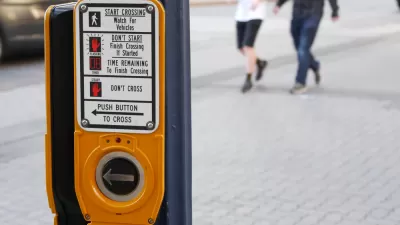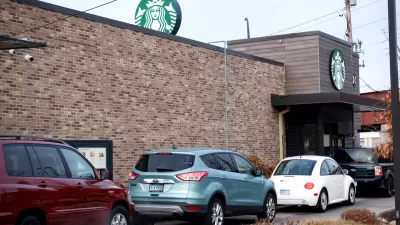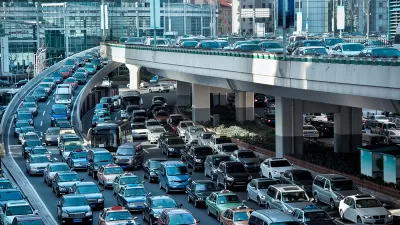Another day, another historic planning-related bill signed into law in the Golden State.

In 2021, California Governor Gavin Newsom vetoed a bill, AB 1238, that would have decriminalized jaywalking in the state, in a major setback for the cause of making streets safer for noon-vehicular modes of transportation.
In 2022, Gov. Newsom signed a similar bill—AB 2147, also known as “The Freedom to Walk Act,” authored by the same state legislator, Assembly Member Phil Ting (D-San Francisco). The law takes effect of January 1, 2023.
Colleenn Shalby reports on the new law for the Los Angeles Times:
Under the new law, pedestrians would be able to legally cross the street outside of designated intersections without the threat of a hefty citation “unless a reasonably careful person would realize there is an immediate danger of collision with a moving vehicle or other device moving exclusively by human power.”
Shalby notes that jaywalking laws grew out of auto industry lobbying in the early 20th century—one of the most obvious signs of the growing car-centric planning and automobile dependence that continues to dominate the American built environment.
Data shows that jaywalking laws in the 21st century have disparate impacts for low-income individuals and people of color. “Data cited by Ting’s office from the California Racial and Identity Profiling Act shows that Black Californians are up to 4.5 times more likely to be stopped for jaywalking than those who are white,” writes Shaby.
The governor’s signature on AB 2147 follows shortly after the ink dried on two other historically significant planning reforms: AB 2097, which remove parking requirements near transit stops, and AB 2011, which made affordable housing developments on commercially zoned properties legal by right.
FULL STORY: Jaywalking is decriminalized in California under new law

Alabama: Trump Terminates Settlements for Black Communities Harmed By Raw Sewage
Trump deemed the landmark civil rights agreement “illegal DEI and environmental justice policy.”

Planetizen Federal Action Tracker
A weekly monitor of how Trump’s orders and actions are impacting planners and planning in America.

The 120 Year Old Tiny Home Villages That Sheltered San Francisco’s Earthquake Refugees
More than a century ago, San Francisco mobilized to house thousands of residents displaced by the 1906 earthquake. Could their strategy offer a model for the present?

LA’s Tree Emergency Goes Beyond Vandalism
After a vandal destroyed dozens of downtown LA trees, Mayor Karen Bass vowed to replace them. Days later, she slashed the city’s tree budget.

Sacramento Leads Nation With Bus-Mounted Bike Lane Enforcement Cameras
The city is the first to use its bus-mounted traffic enforcement system to cite drivers who park or drive in bike lanes.

Seattle Voters Approve Social Housing Referendum
Voters approved a corporate tax to fund the city’s housing authority despite an opposition campaign funded by Amazon and Microsoft.
Urban Design for Planners 1: Software Tools
This six-course series explores essential urban design concepts using open source software and equips planners with the tools they need to participate fully in the urban design process.
Planning for Universal Design
Learn the tools for implementing Universal Design in planning regulations.
Ada County Highway District
Clanton & Associates, Inc.
Jessamine County Fiscal Court
Institute for Housing and Urban Development Studies (IHS)
City of Grandview
Harvard GSD Executive Education
Toledo-Lucas County Plan Commissions
Salt Lake City
NYU Wagner Graduate School of Public Service





























